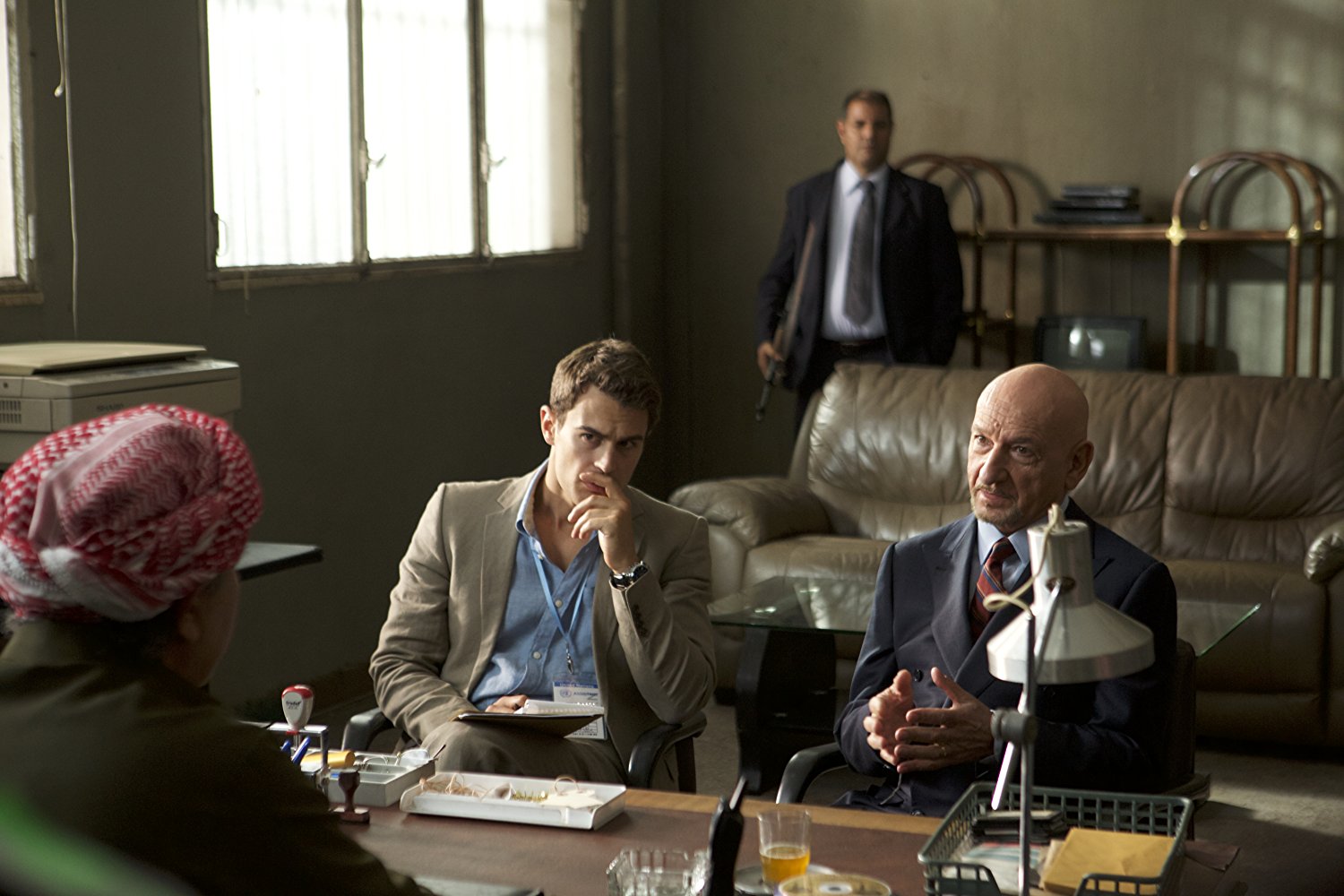BACKSTABBING FOR BEGINNERS
A24 & Directv
Reviewed by: Harvey Karten
Director: Per Fly
Screenwriter: Per Fly, Daniel Pyne
Cast: Theo James, Ben Kingsley, Jacqueline Bisset, Belçim Bilgin, Rossif Sutherland, Rachel Wilson
Screened at: Critics’ link, NYC, 4/14/18
Opens: April 27, 2018
In 1958 Sherman Adams, President Eisenhower’s chief of staff, was forced to resign. He accepted a vicuña coat and an oriental rug from a textile manufacturer doing business with the federal government. In 1923 President Warren Harding’s secretary of the interior Bernard Fall leased oil petroleum reserves in Teapot Dome, Wyoming, to a private company without competitive bidding. He received a bribe in return and was went to prison. These are two of the major examples of thievery in government that high school students had at one time been expected to know.
As America got bigger and voters got more deplorable, incidents like these skyrocketed, as anyone except high school students, who do not follow the news, are aware. Even the U.N. is involved, in one particular case feeding off the billions in money that the Security Council granted to the so-called Oil-for-Food program in Iraq after the defeat of Saddam’s forces in Kuwait.
Danish director Per Fly’s film is a compromise between a search for real truths about the U.N. program and his need to make a thriller out of the scandal, as a documentary without the chills might be too turgid for any but a wonkish audience. It does pay to know something of the program because the film is not entirely clear about how it worked.
Oil-for-Food began in 1996 to allow Iraq to sell enough oil to pay for food for its population, now suffering because of sanctions imposed on Iraq after the first Gulf War. At least 65% of the money did indeed go to the hungry, but that 35% balance can hardly be ascribed to administrative fees. Saddam himself profited, pocketing $1.7 billion through kickbacks and inflated invoices, and another $10.9 billion through illegal oil smuggling. Half of the participating companies gave away kickbacks in return for lucrative contracts.
The film, though fictionalized, serves the cause of emotional truths, centering on a 24-year-old, Michael Sullivan (Theo James). His father was a diplomat, which led him to seek a career in the foreign service. Michael tells Pasha (Ben Kingsley), who interviewed him for the job of his assistant, that he wants to help people. He did help people, but he also helped himself, by giving a false report to the U.N. Security Council, acknowledging that the program was working well, and winning a new grant for 180 days. This the kind of ambiguity that Per Fly seeks: most of the principals are not good guys or bad guys. They’re like many of us: they have a good side and a bad side. Even Pasha, aware of the corruption and an agent for implementing it, tells Michael “…never to lie. But to choose our facts…with the utmost care.” He also rationalizes to Michael: “What you call corruption is the growing pains of a new democracy.”
Pasha, who is ethnically a Cypriot, is fond of saying “Fack!” whenever things get hot. And Christine Du Pre (Jacqueline Bisset), an officer of the program who comes to no good end, seems the only one around who is totally incensed by the corruption. At the same time regional politics makes its mark as Nashim (Belçim Bilgin), who survived Saddam’s deadly campaigned against the Kurds of Northern Iraq (whose movement for independence and a Kurdistan which would include her people from Iraq, Iran, Turkey and Syria), becomes romantically involved with Michael. Some director and co-writer Per Fly sees the need for one sex scene, however unlikely or unnecessary.
Easily the most important relationship, one that plays up the ambiguity that makes “Backstabbing for Beginners” come across as authentic, is between Michael and Pasha, neither being entirely evil or in any way saintly. This is a quality work that digs into the emotional truths of a U.N. program, one that could stand in for many such regimens, pointing out that when almost everybody is digging into the corrupt trough, there’s nobody left to blow the whistle—not that any such angelic folks would be able to survive to die in bed.
The Danish name of the mostly English-language film is “Dobbeltspil” which means “Double Game.” The Middle East scenes were shot in Jordan and Morocco.
Rated R. 108 minutes. © 2018 by Harvey Karten, Member, New York Film Critics Online
Story – B+
Acting – B+
Technical – A-
Overall – B+

